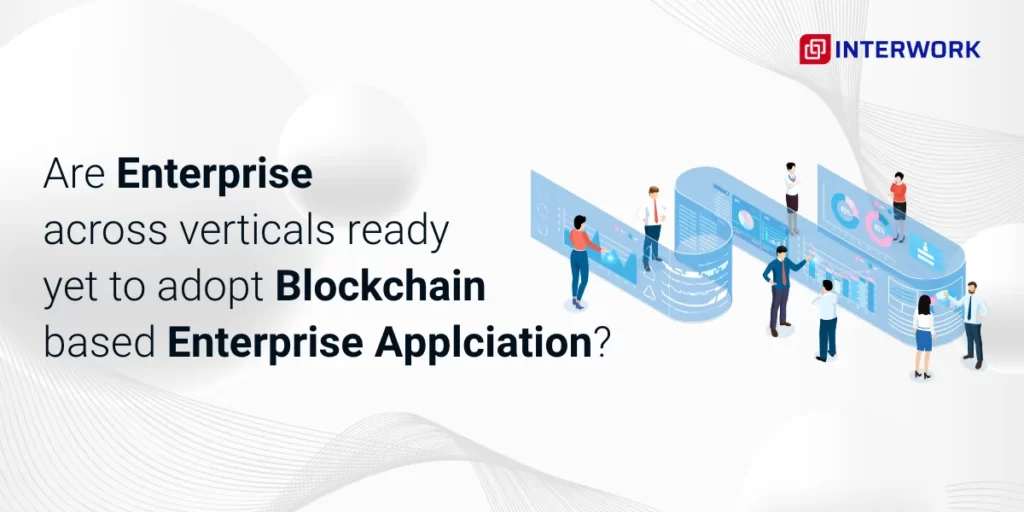Boosting Supply Chain Security with Blockchain and ERP in Smart Industries
Supply chain security is a crucial factor than ever before…

Although the general users of blockchain consider it as a medium of transacting cryptocurrencies, it is the enterprise sphere that is harnessing the potential of the underlying technology. According to PwC’s 2018 Global Blockchain Survey, around 84% of the 600 executives across different business verticals said that their organizations are actively involved in blockchain technology and Blockchain-Based Enterprise Applications.
Enterprises are aggressively moving towards the adoption of disruptive technology. A peer-to-peer decentralized blockchain model promises to bring trust, security, compliance, and automation of business processes. The CTOs and CIOs no longer question whether blockchain is a worthy investment. They have easy access to enterprise-ready Blockchain Solutions making the adoption quick.
Nevertheless, enterprises are proactively exploring new ways of using blockchain solutions in place of legacy systems. As per PwC, 2018 witnessed the noise settlement in blockchain space and the technology established its stance on how it can lead the path of a new-age enterprise operational model. In light of new consortium partnerships between enterprises and blockchain startups in early 2019, the technology market for enterprises is emerging aggressively.
The particular appeal of enterprise-grade blockchain solutions is that it opens collaboration opportunities between enterprises. As Blockchain-Based Enterprise Applications offer unified standards for collaboration between varied operations, the interoperability has significantly enhanced. This adoption is benefiting every stakeholder in the due course. Let us explore the other reasons that are underpinning the adoption:
The enterprises have been using centralized security networks and management systems which are the prime pain points. The centralized system performance and security have been charred by attacks and usage spikes time and again. Addressing the concern, the enterprise peer-to-peer decentralized models use a distributed approach where multiple nodes operate the network so that there is no single point of failure.
Blockchain fund it\’s a first-ever use case in the financial industry because of its capacity to keep transactions transparent, secure, and irrevocable. The organizations have been trying to keep their data discreet but every now and then hackers tamper with the data.
By the utilization of Blockchain-Based Enterprise Applications, data security is enhanced as the data is decentralized thus reducing the tampering risk.
Blockchain is exhibiting an enormous impact on Enterprise transactions. The technology is all set to prevail as it circumvents all the Security and Transactional risks for Enterprises. There is more to it though:
Blockchain frameworks bring forward a Peer-to-Peer Decentralized Model to enterprises eliminating the role of the middleman and leading to cost-optimization of supply chains and business processes.
Enterprises have become more confident about Blockchain as the projects are moving from the pilot phase to the production phase. Fortune 500 companies from varied business verticals like Finance, Healthcare, Real Estate, and Supply Chain are done testing Blockchain and are making use of Enterprise Solutions to exchange data and make transactions.
The Decentralized Applications (dApps) that make use of Blockchain Technology are gaining traction in the enterprise space. These applications help establish a secure and distributed system where smart contracts are used for transactional execution. These are open-source applications that execute on the p2p network and are resistant to downtimes.
dApps protect the identity of the employees in the enterprise ecosystem and can be used to verify the contracts for freelancers or contract-based workers.
The inherent advantages of Blockchain-based Solutions like Decentralization, Security, and Anonymity are improving the interoperability among Enterprises. Although not all enterprise blockchain solutions are decentralized, even the centralized solution offers the highest Security and Transparency.
Some of the potential use cases where the technology is expected to bring disruption are loyalty/reward management, the healthcare sector, information exchange between servers and applications, conducting quick KYC and more. Effectively these use cases target to lower the operational cost and speed of the enterprise system.
The future of Blockchain-Based Enterprise Applications revolves around private solutions instead of public chains. With an aim to enhance transaction performance within the organization, enterprises are pulling up their socks to embrace the disruption. The blockchain space is devoid of opportunistic ICO projects and speculative use cases and is edging towards massive enterprise adoption. As more successful Blockchain-Based Enterprise Applications see the light of day, legacy solution users are joining the bandwagon.